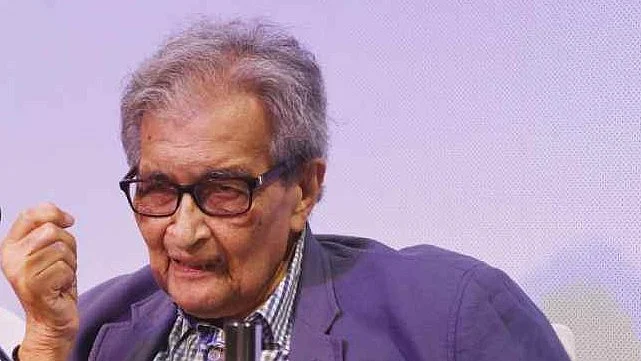"Cannot justify seven new mistakes to correct one": Amartya Sen says SIR risks ‘disenfranchising’ poor people
The 91-year-old economist also appealed for a revival of the longstanding Indian tradition of active Hindu–Muslim cooperation

Nobel laureate Amartya Sen has raised important concerns about the Special Intensive Revision (SIR) of electoral rolls in Bihar, cautioning that if the process is not conducted with care, it could result in disenfranchising large numbers of poor and marginalised people.
He criticised the fairness of bureaucratic procedures that require strict documentation from citizens who may lack such papers, and asserted that while periodic revisions and administrative processes are necessary, they “must not come at the cost of fundamental rights”.
"Yes, it's true that from time to time various procedural tasks need to be carried out. However, in doing so, one cannot create a 'better system' by trampling on the rights of the poor," Sen told reporters on 22 August, Friday.
He stressed that a just and inclusive approach is essential, highlighting that many individuals still do not have the necessary documents and are therefore often left out of the electoral system.
"Many people don't have documents. Many cannot vote... If, in the name of trying to improve things a little, harm is caused to many, then that becomes a serious mistake," Sen said, adding, "You cannot justify seven new mistakes just to correct one."
The SIR initiative, led by the Election Commission (EC), aims to update and verify the accuracy of electoral rolls, striving for error-free voter lists. However, the exercise has faced criticism from political parties and rights activists, especially after the EC’s release of numbers showing that over 65 lakh enumeration forms were ‘not included’ in the draft rolls during the first phase in Bihar, decreasing the registered voters count from 7.9 crore to 7.24 crore.
This removal has prompted accusations that the SIR, if lacking robust safeguards, can result in wrongful deletion of eligible voters—a threat to the bedrock of democratic participation.
Sen is globally renowned for his scholarship on poverty, welfare, and justice, and reiterated that reforms must not override citizens’ rights. "A just system must always protect those who are most vulnerable," he said.
Sen’s remarks come amidst ongoing Supreme Court hearings concerning the SIR in Bihar, where the Court has sought detailed responses from both the Election Commission and the state government on the criteria and manner of voter form exclusions.
The Supreme Court has emphasised that the exercise must uphold constitutional protections and avoid arbitrary disenfranchisement.
Most recently, the chief election commissioner (CEC) addressed these concerns at a press conference, claimed the ECI is committed to transparency and fairness, while also defending the methodology used in the roll revision and pledging corrective measures would be taken for improperly removed voters.
Sen, for his part, made his comments during a public discussion themed 'India's Youth: Social Opportunities They Should Have', where he spoke with undergraduate and high-school students.
The 91-year-old economist also called for India to embrace active communal cooperation — what he termed "yukta sadhana" or "joint practice". Sen cited historical figures like Dara Shikoh and his own grandfather, Kshitimohan Sen, to illustrate the tradition of intellectual and cultural collaboration between Hindus and Muslims in India: "The relationship between Hindus and Muslims is not just about tolerance. It's about collaboration, something we've seen historically in music, literature, and architecture," he said.
Sen’s grandfather’s seminal work Bharate Hindu-Musalmaner Yukta Sadhana [Hindu–Muslim joint endeavours in India], which was written in Bengali and explored shared traditions, was relaunched by the Pratichi Trust on Friday, with a new introduction from Sen that underscores its relevance amid today's increasing social and political polarisation.
Earlier, Amartya Sen had also spoken of the recent targeting of Bengalis as 'Bangladeshi' in India and said, "I might be sent back to Bangladesh because my ancestral home is in Dhaka." It can, of course, hardly be denied at this point that this emanates from a certain political narrative that frames Muslims as a danger to Indian society and to communal harmony in India.
With PTI inputs
Follow us on: Facebook, Twitter, Google News, Instagram
Join our official telegram channel (@nationalherald) and stay updated with the latest headlines
